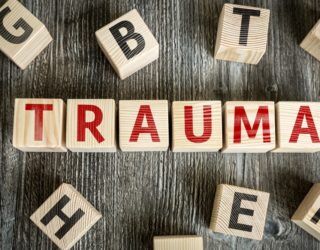One in four children or adolescents in the U.S. experiences at least one traumatic event before the age of 16. 13% of traumatized youth will go on to develop PTSD. The links between PTSD and addiction are well established, but it’s important to fully understand the connection between trauma and the increased risk of addiction in vulnerable persons. Understanding how trauma increases addiction rates, and how unresolved trauma can impede recovery rates is critical for helping victims achieve sobriety and avoid relapse.
Trauma and Addiction


Trauma and Addiction
How Trauma Increases the Risk of Addiction
What is the link between trauma and addiction rates?
Unresolved trauma increases stress and can also trigger mental health conditions, such as PTSD, depression, and anxiety. 59% of young people who have PTSD also struggle with addiction to drugs or alcohol.
Despite their illegality, psychoactive substances are easy to obtain, and alcohol is readily available. By 8th grade, one in three U.S. teens has experimented with drugs or alcohol. Earlier use of drugs or alcohol is also positively correlated with an increased risk of lifetime addiction. For individuals of traumatic experiences, they will often turn to substances to find relief from their symptoms.
Many different studies have found that substance use follows a traumatic experience in up to 76% of cases. These studies have also indicated that people who use drugs or alcohol to cope with trauma or PTSD have a more difficult time stopping use than people who do not use drugs to cope with trauma. Being exposed to events, places, or people that trigger symptoms of PTSD or remind users of their traumatic event increases drug or alcohol cravings.
For teenagers and youth who turn to substances to treat the effects of trauma, they are putting themselves at increased risk of experiencing more traumatic events. So, trauma leads to addiction, and addiction also leads to more trauma.
How does drug or alcohol abuse increase the incidence of traumatic events?
Several studies have found that up to 66% of people with a substance use disorder will go on to experience a traumatic event that is directly related to using drugs or alcohol. There are many reasons for this, but the most significant cause is that alcohol and drug use cause people to engage in risky behavior, either to obtain drugs or as a result of getting high or drunk and the impaired judgment that results. Driving while under the influence, traveling to unsafe neighborhoods to obtain illegal drugs, or getting into physical altercations over drugs can all increase the chances of a person experiencing trauma from drug use. One in five surveyed heavy drinkers reports driving while under the influence within the past year. In addition, people who struggle with drug or alcohol abuse are at increased risk of sexual assault and rape.
Evidence also suggests that people who struggle with drug or alcohol addiction are less able to cope with a traumatic or stressful event because of functional impairments associated with alcohol or substance addiction. Studies indicate that after controlling for exposure to trauma, young people with a substance use disorder were twice as likely to develop PTSD from a traumatic event than their non-addicted peers. It’s possible that drugs or alcohol abuse cause psychosocial impairment that could be contributing to increased risk for PTSD following a traumatic event in people who are addicted to drugs or alcohol.
What types of trauma are the most commonly associated with drug or alcohol addiction?
Physical wounds eventually heal, but emotional pain leaves scars that can run incredibly deep and completely change a person’s perspective on life and their ability to cope and function without turning to drugs or alcohol. The effects that a traumatic event has on someone will vary from person to person, but the following types of traumatic events are most likely to lead to substance abuse and PTSD.
- Sexual Assault
- Emotional and Physical Abuse in Childhood
- Grief and Loss
- Crime and Accidents
- Natural Disasters and War
Who is most at risk for going on to develop a dependence on drugs or alcohol after trauma?
Everyone copes with trauma differently, but there are a few different demographic risk factors that increase a person’s chances of turning to drugs or alcohol to cope after a traumatic event. The people most at risk of turning to drugs or alcohol to cope after a traumatic event share the following demographic characteristics:
- Being unemployed
- Having a low level of education
- Having an Axis 1 clinical disorder, especially depression
Moreover, people who are most at risk for developing PTSD and turning to drugs or alcohol to cope are those who work in emergency responder occupations, such as police officers, firefighters, medical professionals, and members of the military.
What type of treatment does someone with trauma and co-occurring substance abuse need to recover?
Although drugs or alcohol may seem to alleviate stress and pain from trauma, drug and alcohol abuse perpetuates problematic behaviors and puts people at increased risk of experiencing further traumatic situations. It’s critical for traumatized individuals to get treatment that addresses their needs holistically and uses integrated therapeutic approaches to treat both trauma and addiction.
Recent research and clinical studies indicate that it is a mistake to treat substance or alcohol abuse separately from the traumatic event that spawned it. Both substance abuse and the effects of trauma display similar behavior patterns that compound each other. It’s crucial that patients have access to mental health professionals and therapists who can see beyond immediate patterns of substance abuse and look to the patient’s traumatic history and how it relates to addictive behavior.
For patients, they will need to attend a facility that provides integrated care for trauma and substance abuse. Experienced therapists can help patients address their trauma triggers and cope with them in healthy ways so that patients will not turn to drugs or alcohol to numb the pain and stress of past traumatic experiences.
If you or someone you love has gone through a traumatic event and is struggling with substance abuse, please reach out to an experienced mental health counselor today to explore your treatment options for trauma and addiction.





